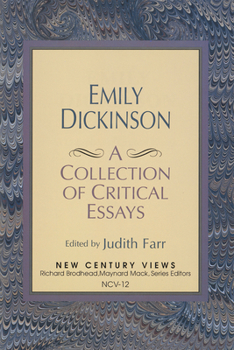Emily Dickinson: A Collection of Critical Essays
Select Format
Select Condition 
Book Overview
A truly useful collection of literary criticism on a widely studied author, this collection of essays, selected and introduced by a distinguished scholar, makes the most informative and provocative critical work easily available to the general public. KEY TOPICS: Offers volumes of the same excellence for the contemporary moment. Captures and makes accessible the most stimulating critical writing of our time on a crucial literary...
Format:Paperback
Language:English
ISBN:013033524X
ISBN13:9780130335241
Release Date:August 1995
Publisher:Pearson
Length:272 Pages
Weight:0.78 lbs.
Dimensions:0.6" x 6.0" x 9.0"
Customer Reviews
2 ratings
Success is counted sweetest by those who ne'er succeed
Published by Thriftbooks.com User , 19 years ago
This is a review of the anthology edited by Richard B. Sewall. It gives much useful information and analysis of the poetry of Dickinson. Sewall's provides a useful introductory essay in which he centers on the significance of the 1955 first complete edition of her poems ed. by Thomas Johnson. I was surprised however by so many negative notes on her poetry, especially those of Yvor Winters, and Richard Blackmur. It is as if they were truly to hold her and judge her by some kind of objective rule for poetry. But a great poet and she is truly a great poet makes a rule of their own. Emily Dickinson creates a language and a world, a way of seeing things and feeling things so deep so unique so metaphorically adventurous and beautiful that it is one of truly great works of poetic art that we have. "Speech is a symptom of affection And Silence one, The perfectest Communication Is heard of none..
True art escapes categories.
Published by Thriftbooks.com User , 23 years ago
EMILY DICKINSON: A COLLECTION OF CRITICAL ARTICLES. Edited by Judith Farr. New Century Views. 268 pages. Upper Saddle River, NJ: 1996. ISBN 0-13-033524-X (pbk).After an interesting, informative, and vigorously written Introduction by Judith Farr, eighteen articles of varying quality follow. Of the eighteen, at least eight are definitely worth reading. From these eight, the reader comes away with an enhanced appreciation of ED's work, with a better idea of how to go about reading and understanding her poems, and in awe of her giant sensibility.Most of the remaining essays, unfortunately, seem to a greater or lesser extent to share the same defect. They have been written from either a Christian or feminist perspective, and seem determined at all costs to find ways of making ED fit the procrustean beds of their respective ideologies. As such they end up telling us much more about their writers than about ED, and I personally found many of them unreadable.There are so many today who seem determined to reduce ED, to cut her down to their own diminished size and rope her in for their particular cause, so many partisans who are desperately pretending: "In fact, you know, Emily Dickinson is really one of us!" ED, it is stridently affirmed, was an American, a Christian, and a female poet of the 19th century. But we all know that there were many such poets. And where are they now? Who is reading them? No-one. And if that's all ED had been I don't think anyone today would be reading her either.ED escaped all bounds. She was, in a sense, not an 'American,' certainly not a 'Christian,' and not even a 'woman.' She was a human being immersed like all of us in the human condition, and speaking to us out of that condtion in a way no-one has ever spoken before. "Truth is so rare a thing," she once said, and her poems offer us that commodity in abundance, irrespective of our nationality, religion, or gender. Relevant here is the indignant remark of Georgia O'Keefe which Judith Farr quotes in her fine Introduction: "I am not a _woman_ artist, I am an Artist." Farr comments: "True art, as Dickinson herself suggests . . . finally escapes categories: national, temporal, sexual" (p.15, italics in original). In other words, as a poet, ED addresses herself, not to that which divides us, but to our shared humanity. Besides Judith Farr, I think that of the critics in the present collection at least eight others would probably agree with this. The general excellence and unbiased quality of their pieces make this collection well worth having:Richard Wilbur, for his extremely interesting "Sumptuous Destitution," (a piece which is immediately followed by a rather weak and unconvincing feminist riposte).Cynthia Griffin Wolff, for her Bakhtinian '[Im]pertinent Constructions of the Body and Self.' Suzanne Juhasz, for her stimulating "The Landscape of the Spirit." David Porter, for his 'Strangely Abstracted Images,' an extract from his The Modern Idiom (19






